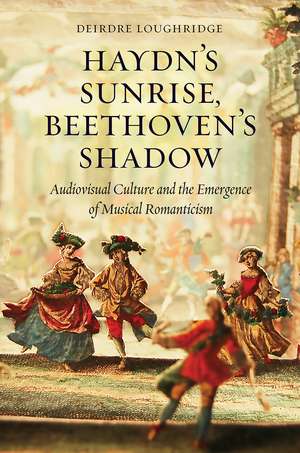Haydn’s Sunrise, Beethoven’s Shadow: Audiovisual Culture and the Emergence of Musical Romanticism
Autor Deirdre Loughridgeen Limba Engleză Hardback – 6 sep 2016
The years between roughly 1760 and 1810, a period stretching from the rise of Joseph Haydn’s career to the height of Ludwig van Beethoven’s, are often viewed as a golden age for musical culture, when audiences started to revel in the sounds of the concert hall. But the latter half of the eighteenth century also saw proliferating optical technologies—including magnifying instruments, magic lanterns, peepshows, and shadow-plays—that offered new performance tools, fostered musical innovation, and shaped the very idea of “pure” music. Haydn’s Sunrise, Beethoven’s Shadow is a fascinating exploration of the early romantic blending of sight and sound as encountered in popular science, street entertainments, opera, and music criticism.
Deirdre Loughridge reveals that allusions in musical writings to optical technologies reflect their spread from fairgrounds and laboratories into public consciousness and a range of discourses, including that of music. She demonstrates how concrete points of intersection—composers’ treatments of telescopes and peepshows in opera, for instance, or a shadow-play performance of a ballad—could then fuel new modes of listening that aimed to extend the senses. An illuminating look at romantic musical practices and aesthetics, this book yields surprising relations between the past and present and offers insight into our own contemporary audiovisual culture.
Deirdre Loughridge reveals that allusions in musical writings to optical technologies reflect their spread from fairgrounds and laboratories into public consciousness and a range of discourses, including that of music. She demonstrates how concrete points of intersection—composers’ treatments of telescopes and peepshows in opera, for instance, or a shadow-play performance of a ballad—could then fuel new modes of listening that aimed to extend the senses. An illuminating look at romantic musical practices and aesthetics, this book yields surprising relations between the past and present and offers insight into our own contemporary audiovisual culture.
Preț: 320.09 lei
Preț vechi: 372.97 lei
-14% Nou
Puncte Express: 480
Preț estimativ în valută:
61.28€ • 63.02$ • 50.84£
61.28€ • 63.02$ • 50.84£
Carte indisponibilă temporar
Doresc să fiu notificat când acest titlu va fi disponibil:
Se trimite...
Preluare comenzi: 021 569.72.76
Specificații
ISBN-13: 9780226337098
ISBN-10: 022633709X
Pagini: 328
Ilustrații: 5 color plates, 33 halftones, 68 musical examples, 4 tables
Dimensiuni: 152 x 229 x 25 mm
Greutate: 0.57 kg
Ediția:1
Editura: University of Chicago Press
Colecția University of Chicago Press
ISBN-10: 022633709X
Pagini: 328
Ilustrații: 5 color plates, 33 halftones, 68 musical examples, 4 tables
Dimensiuni: 152 x 229 x 25 mm
Greutate: 0.57 kg
Ediția:1
Editura: University of Chicago Press
Colecția University of Chicago Press
Notă biografică
Deirdre Loughridge is assistant professor in the Department of Music at Northeastern University.
Cuprins
Introduction: Audiovisual Histories
One From Mimesis to Prosthesis
Two Opera as Peepshow
Three Shadow Media
Four Haydn’s Creation as Moving Image
Five Beethoven’s Phantasmagoria
Conclusion: Audiovisual Returns
Acknowledgments
Notes
Select Bibliography
Index
One From Mimesis to Prosthesis
Two Opera as Peepshow
Three Shadow Media
Four Haydn’s Creation as Moving Image
Five Beethoven’s Phantasmagoria
Conclusion: Audiovisual Returns
Acknowledgments
Notes
Select Bibliography
Index
Recenzii
“This work compellingly argues that the marriage between visual and audio cultures is not a late twentieth-century phenomenon, but has roots in the late eighteenth and early nineteenth centuries. By drawing upon a plethora of technical devices deployed in operas and popular performances, Loughridge demonstrates how listeners' practices and thought were shaped by numerous mechanical contraptions and scientific instruments. This book represents a significant contribution to both musicology and the history of science.”
“Haydn’s Sunrise, Beethoven’s Shadow is a rich account of the history of early romantic listening. Imaginative and learned, this book reveals that behind the music’s power to transport lurked audiovisual technologies—telescopes, peep boxes, and magic lanterns—that informed listeners’ musical experiences. Loughridge shows us how to hear canonical works in new ways and casts light on a wealth of understudied repertoire.”
“With a captivating sense of intellectual adventure, this book presents a history of modern audiovisual culture that is both longer and more complex than most scholars have recognized, all the while radically reshaping our view of some of the most canonical moments in Western music. Haydn’s Sunrise, Beethoven’s Shadow shows, with great elegance and erudition, that romantic musical metaphysics became thinkable only via the mediation of new visual technologies and the multisensory experiences that they promoted.”
“This is an important, ambitious, and timely study. It uncovers fascinating source material and weaves together original ideas about practice that challenge our understanding of musical romanticism—and some of its core repertory—and encourage us to think about nineteenth-century culture in fresh ways. Haydn’s Sunrise, Beethoven’s Shadow will have strong appeal to specialists across fields, as well as to the broader public.”
